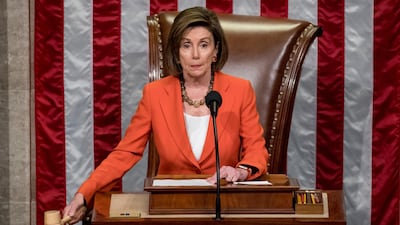The US House of Representatives on Thursday set Donald Trump on a path towards becoming only the third American president in history to be impeached.
The House passed a resolution on Thursday that starts the public phase of the inquiry.
It voted 232 to 196 along mostly partisan lines to begin open hearings to investigate what Democrats say is an abuse of power by Mr Trump in pressuring Ukraine to undertake an investigation for his own political benefit.
All signs point to the House taking a formal vote on articles of impeachment against Mr Trump, possibly before the end of the year.
But it would take a two thirds majority vote in the Republican-controlled Senate to convict him, and therefore remove him from office, which would have to be considered highly unlikely.
Only two other presidents were impeached: Andrew Johnson in the post-Civil War era; and Bill Clinton in 1998.
In both cases the Senate failed to convict them. Richard Nixon resigned before the full House voted on articles of impeachment.
“No one comes to Congress to impeach a president,” House Speaker Nancy Pelosi said before the vote.
But Ms Pelosi said that legislators had a duty to uphold.
“Proudly, we all raised our hand to protect the Constitution of the United States," she said. "That is what this vote today is all about.”
Republicans complained that the process had been tainted.
”At least today the majority’s admitting what we have known all along, that the House was not following an appropriate process for impeachment,” Republican Tom Cole said.
Mr Trump’s spokeswoman said after the vote that the Democrats were pursuing impeachment at the expense of legislating on behalf of voters, even though the president “has done nothing wrong”.
“Nancy Pelosi and the Democrats’ unhinged obsession with this illegitimate impeachment proceeding does not hurt President Trump, it hurts the American people,” White House press secretary Stephanie Grisham said.
Only two Democrats joined all of the Republicans present in opposing the measure – Collin Peterson and Jeff Van Drew.
Justin Amash, a Republican turned independent who has been a Trump critic, voted for the resolution.
Ms Pelosi, who took the unusual step of presiding over the vote, said that a decision to impeach Mr Trump “has not been made”.
She and other Democrats described it as a sombre occasion.
”This a sad day for our country,” said Jim McGovern, the Democrat who introduced the resolution as chairman of the House rules committee.
“We are not here in some partisan exercise, we are here because the facts compel us to be here.”
The acrimony will only increase with a public airing of the details of Mr Trump‘s pressure on Ukraine to investigate Democrats and Joe Biden, a potential challenger to the president in the 2020 election.
With many of the facts already confirmed publicly by White House documents and Mr Trump, the ultimate question for legislators is whether that conduct is impeachable.
House Republicans insist it is not.
Jim Jordan, the top Republican on the House oversight and reform committee, said Democrats were trying to impeach the president 13 months before the 2020 election based on “a complaint from an anonymous whistle-blower with no first-hand knowledge with a bias against the president”.
Mr Trump has lashed out against Democrats throughout the inquiry. On Thursday he tweeted that the process was harming stock prices.
Many Democrats initially said they expected the process to be wrapped up by December, sending the impeachment to the Senate for trial.
Some members have privately said that timeline could extend into 2020. Trial in the Senate would almost certainly extend into the election year.
The resolution does not establish a deadline for the investigation.
It directs six House committees to continue investigating different aspects of Mr Trump’s administration, business and associates, with the intelligence committee leading the inquiry into the Ukraine-related allegations.
The intelligence, oversight and foreign affairs committees have been hearing private depositions for about month, which will continue. Public hearings could begin in two weeks.
Intelligence committee chairman Adam Schiff, who has become the Democrats’ public face of the inquiry, said the next phase of was “one in which the American people will be able to hear from the witnesses first-hand”.
Material gathered during this phase will be turned over to the judiciary committee, where chairman Jerrold Nadler, a New York Democrat, would hold additional hearings in which Mr Trump or his lawyers can take part.
The judiciary committee would be responsible for drafting any articles of impeachment.
Mr Cole said the process laid out in the resolution was unfair to the president, the House and the American people.
“The process laid out in the resolution before us is different from the process used for both President Nixon in 1974 and President Clinton in 1998,” he said.
The Republican Senate Majority Leader, Mitch McConnell, who will shape the Senate trial should the House impeach Mr Trump, said the resolution denied the “most basic rights of due process”.

